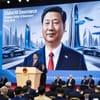Chinese President Xi Jinping has proposed the creation of a new global organisation dedicated to overseeing the governance and ethical use of artificial intelligence. The proposal, announced during a major AI conference in Shanghai, aims to address what Beijing describes as the “fragmented and uneven” state of current AI governance. China argues that the world needs a unified platform where governments, international institutions, and technology companies can jointly set standards and coordinate regulations for responsible AI development.
The proposed organisation, tentatively called the World Artificial Intelligence Cooperation Organization, would be headquartered in Shanghai and serve as a multilateral platform for collaboration, policy alignment, and technology sharing. Chinese officials outlined a 13-point action plan that emphasises global cooperation, shared access to computing resources, and inclusion of developing nations in AI advancement. The initiative is framed as a move toward “AI for all,” designed to prevent monopolisation of the technology by a handful of powerful countries or corporations.
Analysts suggest that China’s proposal has significant geopolitical undertones. By taking a leadership role in shaping international AI norms, Beijing seeks to enhance its global influence in the emerging technological order. The plan can be seen as a counterbalance to Western-led frameworks such as the EU’s AI Act or the U.S.-backed Bletchley Declaration. It also signals China’s ambition to position itself not just as a developer of AI technology but as a key rule-maker in its global governance.
For other nations, including India, this development presents both opportunity and strategic challenge. Countries may view the proposal as a chance to participate in shaping inclusive and balanced AI rules but will also weigh concerns over sovereignty, transparency, and governance control. As global competition intensifies, the success of Xi’s proposed AI body will likely depend on whether it can build trust across geopolitical divides and deliver real cooperation in an increasingly fragmented digital world.


